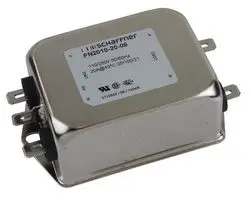Description
What is an RFI Filter?
An RFI (Radio Frequency Interference) filter is an electronic device designed to suppress or reduce unwanted electromagnetic interference (EMI) and radio frequency interference (RFI) in electrical circuits. It is commonly used in electronic equipment and systems to prevent interference from affecting the performance and reliability of sensitive components.
How Does an RFI Filter Work?
An RFI filter works by suppressing or attenuating unwanted electromagnetic signals that can interfere with the regular operation of electronic devices. It typically consists of passive components, such as capacitors, inductors, and resistors, specifically designed to block or absorb unwanted frequencies.
When an electrical device is connected to a power source, it can generate electromagnetic signals that can radiate and interfere with other nearby devices. The RFI filter is placed in the circuit to intercept these unwanted signals and redirect them to the ground or absorb them, preventing them from reaching other components.
Benefits of Using an RFI Filter
Using an RFI filter can provide several benefits:
- Improved Performance: An RFI filter can help electronic devices perform optimally without disruptions or malfunctions by reducing interference.
- Enhanced Reliability: RFI filters can prevent damage to sensitive components caused by interference, leading to increased reliability and longevity of the equipment.
- Compliance with Regulations: Many industries have regulations and standards to limit electromagnetic interference. By using RFI filters, companies can ensure compliance with these requirements.
- Protection of Nearby Devices: RFI filters can prevent interference from affecting other devices nearby, maintaining the entire system’s integrity.
In conclusion, an RFI filter is an essential component in electronic systems. It mitigates the effects of electromagnetic interference, ensuring optimal equipment performance and reliability.






Reviews
There are no reviews yet.